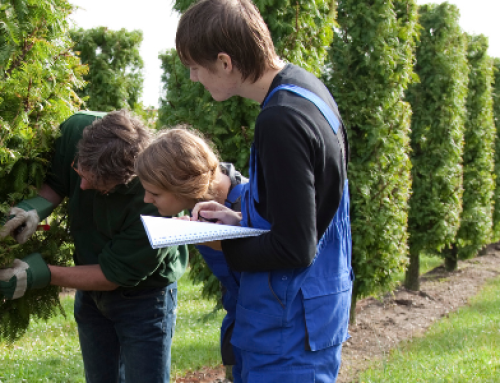Federal budget – wrap
Treasurer the Hon Dr Jim Chalmers handed down the 24/25 Australian Federal Budget on Tuesday 14 May. Skills were a central feature of a Budget that aims to “train the skilled workforce we need right across the economy” (Media release, Minister O’Connor).
This blog post covers key Budget features related to the skills sector, including:
- Australian Apprenticeship incentives and programs
- Fee-free TAFE and VET
- Integration of VET and higher education
- Changes to labour hire
- Supports for small business
- Employment services reform
Australian Apprenticeships
Incentives and financial supports
There have been two major announcements related to the Australian Apprenticeship Incentives System: Expanded new energy incentives, and changes to support for priority occupations.
New energy
The expanded New Energy Apprenticeship Program provides up to $10,000 in financial support to apprentices working in new energy occupations. Changes to eligibility from 1 July 2024 mean that a greater number of occupations are eligible for incentives, for apprentices who “meaningfully engage with clean energy” (DEWR PBS, page 19).
This change comes after feedback from industry and Jobs & Skills Australia that the eligibility criteria were too narrow, and that an expanded eligibility would better support the skills development of a future clean energy workforce.
New energy is also supported through funding for an expanded clean energy teacher and trainer workforce, and $50 million towards capital and equipment investment for training facility upgrades.
Priority occupation incentives
The Australian Apprenticeships Incentives System was due to undergo several changes from 1 July 2024, some of which have been changed.
There has been no change announced to the planned reduction of incentives for non-priority occupations. However, for Australian Apprenticeship Priority List occupations, the planned reduction has been changed into an increase in incentives.
“The Government will invest a further $265.1 million over four years from 2024–25 in the Australian Apprenticeships Incentive System (AAIS), to continue supporting apprentices in priority occupations. This means apprentices in priority occupations will receive an additional $2,000 and their employers will receive an additional $1,000 above planned settings, for a total of $5,000 for eligible apprentices and $5,000 for their employers.” (DEWR PBS, page 19)
This Budget announcement aims to provide stability in priority occupation apprenticeships while the Strategic Review of the Australian Apprenticeships Incentives System continues, which aims to “…investigate how the Apprenticeships System can best support high quality apprenticeships and traineeships” (DEWR PBS, page 19).
Support loan changes
Australian Apprentices, along with higher education and VET students, may be eligible for support loans. The Federal Government plans to change the indexing of loans to make them fairer, by indexing to either the Consumer Price Index (CPI) or Wage Price Index (WPI), whichever is lower. This change will be backdated so the 7.1% index from 2023 will be reduced to 3.2%.
Priority industries
Group training support for priority industries
Small and medium sized businesses (SMEs) in the clean energy, manufacturing and construction industries will be eligible for reduced price support from Group Training Organisations (GTOs). When taking on a priority occupation apprentice in one of these industries, the GTO fees will be reimbursed by government up to $1500 per year over the life of the apprenticeship.
This initiative should support higher completion rates and greater diversity of apprentices within these priority industries and roles. It will also support employers who are unable to take on an apprentice for the full duration of the apprenticeship, through the GTO rotation model.
Australian Skills Guarantee
The Australian Skills Guarantee Procurement Connected Policy was released in May, for rollout from 1 July 2024.
“The Government will invest an additional $10.6 million over four years from 2024–25 to support the implementation of the Australian Skills Guarantee. From 1 July 2024, the Government is introducing new national targets for apprentices, trainees and paid cadets (including specific targets for women that increase annually) to work on Government-funded major projects. This initiative will enable the introduction of a robust and reliable reporting system to monitor progress against the targets, and support suppliers to comply with their new obligations.” (DEWR PBS, page 19).
The Federal Budget allocates additional funding to the implementation of the Guarantee, with a focus on reporting and monitoring to ensure that targets are met.
Defence apprenticeships
A “pilot apprenticeships program in in trades required to support the nuclear-powered submarine enterprise” (Budget Paper #1, page 24) has been announced as part of $101.8 million over seven year to support deliver of Australia’s submarine program. These pilot apprenticeships will be delivered through the Skills and Training Academy.
Labour hire
Currently, Group Training Organisations in some states are regulated under labour hire regulations. The Budget includes funding to support a national labour hire regulation scheme, which will be led by the Victorian Government who are currently the administrators of the largest labour hire scheme in Australia. This initiative aims to develop a harmonised national scheme, supplanting the current state based schemes.
VET and skills
Fee-free TAFE and VET has been a cornerstone of the Albanese Labor Government’s skills direction. The current Budget continues this focus, with an additional 20,000 fee-free places offered by TAFEs and industry-specialist training providers in construction.
“As part of this commitment, the Government will work with jurisdictions to support 5,000 people to access pre-apprenticeship programs, designed to give students an experience of working in construction-related trades.” (DEWR PBS, page 20)
To support fee-free TAFE, there will be a second phase of promotions aiming to raise awareness of this initiative, including “strategic communication activities to boost the status of VET and encourage the uptake and use of VET pathways.” (DEWR PBS, page 20)
There was no specific information in the Budget about activities that relate to recommendations from the Shared Vision, Equal Pathways report from the Parliamentary Inquiry into the perceptions and status of VET. However, communications that promote the update and use of VET address some of the items from this report, along with further investment into the National Careers Institute.
Migrant skills assessments
To increase the pipeline of skilled workers in the construction industry, the Government is investing in an update of policy settings to “streamline skills assessment requirements for migrants seeking to work” in construction roles. The target of this streamlined skills assessment will be tradespeople migrating from countries with similar training frameworks to Australia.
Building women’s careers
The Government, including through Jobs and Skills Australia, has recognised that the most critical skills shortages are in highly gender segregated industries and occupations. To increase women’s participation in critical skills shortage areas of construction, clean energy, advanced manufacturing and digital technology, the Government will start a new Building Women’s Careers program.
“This will support women to build the skills to achieve secure, well-paid employment, while helping to increase broader women’s participation, which is critical to overcoming skills shortages across the economy.” (DEWR PBS, page 19)
This program will encompass both large and small scale projects, including place-based partnerships, that improve women’s access to flexible, safe and inclusive work and training. It will drive structural and cultural change in both work and training environments, working with diverse stakeholders to achieve these outcomes.
Net zero transition
Transition to a net zero economy will create new opportunities for workers but will also affect existing industries. The Government is supporting affected communities through “comprehensive employment and skills services, which may include career advice, job search assistance, case management, training and other supports.” (DEWR PBS, page 20)
There is an additional focus on coal and gas fired power stations, with the Energy Industry Jobs Plan supporting workers to find roles that fit their skills and experience. There is also funding for the Fair Work commission to administer a new ‘communities of interest’ for the closure of power stations and for employers who are dependent on them. “This is intended to provide a smooth and orderly transition for workers and employers in affected communities.” (DEWR PBS, page 20)
Cost of living relief
VET students who are studying nursing and undertaking mandatory work placements will be eligible for cost of living relief. This is an action from the Universities Accord report which aims to support both VET and University students in priority courses who are undertaking placements.
Integration of VET and HE systems
The Universities Accord has informed many of the Budget priorities for both the Department of Employment and Workplace Relations (DEWR) and the Department of Education, as several of these initiatives overlap with skills and VET.
Developing a more integrated post-secondary education system is a priority across both Departments, with investment into DEWR and ASQA to support the creation of a more integrated tertiary education sector and to lay the foundations of future reform.
“The Government will provide $14.6 million over four years to (the Department of Employment and Workplace Relations), and $1.3 million to the Australian Skills Quality Authority (ASQA), to help create a more joined-up tertiary education sector and lay the foundation for broader tertiary education reforms in the future. This includes immediate measures that focus on improving student experience and pathways through better credit recognition, enabling regulatory alignment and improving the evidence base of student movements between sectors through better data collection.” (DEWR PBS, page 20)
The Department of Education is working with the university sector and states and territories to establish a new Australian Tertiary Education Commission (ATEC) which will be an independent steward of the tertiary education system. They will provide strategic stewardship to the sector, inform policy, planning, implementation and coordination of tertiary education, and provide stronger governance and oversight to public funding in higher education.
The Department of Education has released a factsheet about ATEC to support understanding of this initiative.
There is also funding to support immediate measures that break down barriers between VET and higher education, with an aim of a more seamless and aligned tertiary system. This includes better recognition of prior learning and credit transfer, along with streamlined regulation for dual sector providers. Other Budget measures fund improved data and evidence collection which inform understanding of movements between the VET and university sectors.
Support for small business
The Government is continuing support for small businesses to meet their employment obligations, with funding to make the Fair Work Ombudsman’s Employment Advisory Service ongoing. This service provides free and tailored advice to small businesses to help them understand the law. Under this funding, Fair Work will also develop new resources to support small businesses understand and comply with the new right to disconnect laws.
There is also continued funding for the Productivity, Education and Training Fund grant program. This funding continues support for eligible employer and worker organisations to engage with workplace relations and payday superannuation reforms, while implementing education that supports embedding these new laws into workplaces.
Employment services
The Government has flagged broad reforms to employment services, however the current Budget has a number of initiatives that underpin movements to reform. The Government aims to improve the current system to ensure safeguards for clients, while commencing consultations on the future of the employment services system.
There are a raft of changes to employment services in the Department of Social Services Budget papers, including:
- Investment into the Digital Services Contact Centre for people using Workforce Australia Online.
- Critical improvements to the Workforce Australia IT systems, to reduce the administrative burden on employment service providers.
- Recognising individual circumstances with more appropriate mutual obligation rules for those who receive income support, and for those receiving Carer Allowances.
- Removing the time limit for temporary medical incapacity exemptions and basing this on advice from medical practitioners.
- Increased time for people to reengage with their provider if they have not met mutual obligations, and removing compliance measures the first time someone doesn’t meet their mutual obligation requirements.
- All applications of financial penalties will be approved by an APS decision maker.
- Strengthened complaints mechanisms for people using employment services, including the establishment of a central complaints team.
From 1 July 2025 the current Disability Employment Services will be replaced with a new program. These reforms aim to improve the quality of services for participants and employers, and will remove barriers to access. A new Disability Employment Centre of Excellence will be established to lift the capacity of employment service providers to deliver high quality services.
Employment pathways program
Two new programs will support job seekers to connect with work opportunities. These programs will provide reimbursement for employers who take on people with barriers to employment, including complex barriers.
“The Real Jobs, Real Wages pilot will support people who are at risk of long-term unemployment by placing them in jobs with employers who will receive wage reimbursements for up to six months. WorkFoundations will assist people with complex vocational and/or non-vocational barriers to build their work readiness in a supportive work environment with funding available for social enterprises and other suitable businesses for paid employment placements of up to six months, with tailored, wrap-around supports.” (DEWR PBS, page 14)






